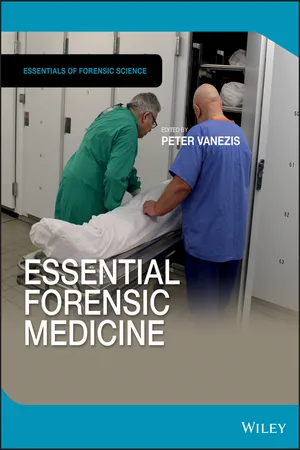
- English
- ePUB (mobile friendly)
- Available on iOS & Android
Essential Forensic Medicine
About this book
Provides an invaluable distillation of key topics in forensic medicine for undergraduate, masters, and postgraduate students
Essential Forensic Medicine covers the broad area of the forensic medical sciences, delivering core knowledge in the biomedical sciences, and the law and ethics surrounding them. Concise, accessible chapters cover a wide range of topics from basic forensic identification and examination techniques to forensic toxicology and psychiatry.
Written by internationally-recognized experts in the field, this authoritative guide offers complete chapter coverage of the legal system, courts, and witnesses; investigation of the deceased and their lawful disposal; and the duties of a registered medical practitioner and the General Medical Council. It instructs readers on the general principles of scene examination and the medico-legal autopsy including how to interpret the many kinds of injuries one can suffer—including those from blunt impact and sharp force, firearms and explosives, asphyxia and drowning. Further chapters cover sexual offences, child abuse, and using DNA in human identification, mental health, alcohol and drug abuse.
- A fresh, accessible, up to date textbook on forensic medicine
- Written by a well-known experts with decades of experience in the field
- Includes numerous figures and tables, and detailed lists of key information
- Features numerous case studies to reinforce key concepts and ideas explored within the book
- Helps students to prepare for examinations and enables practitioners to broaden their understanding of the discipline
Part of the "Essential Forensic Science" series, Essential Forensic Medicine is a highly useful guide for advanced undergraduate students, master's students, and new practitioners to the field.
Tools to learn more effectively

Saving Books

Keyword Search

Annotating Text

Listen to it instead
Information
1
The Legal System, Courts, and Witnesses
1.1 Introduction
1.1.1 Common law
1.1.2 Civil law (Roman law)
1.2 British courts
1.3 The Supreme court of the United Kingdom
- England and Wales: the Court of Appeal, Civil Division; the Court of Appeal, Criminal Division; the High Court in some limited cases
- Scotland: the Court of Session
- Northern Ireland: the Court of Appeal in Northern Ireland; the High Court in some limited cases.
1.4 English and Welsh courts
1.4.1 Court of Appeal
1.4.2 High Court
1.4.3 County Courts
1.4.4 Crown Court
1.4.5 Magistrates' Courts
Table of contents
- Cover
- Table of Contents
- List of Contributors
- Series Foreword
- Preface
- Acknowledgements
- 1 The Legal System, Courts, and Witnesses
- 2 Investigation of the Deceased and Their Lawful Disposal
- 3 The Duties of a Registered Medical Practitioner and the General Medical Council
- 4 General Principles of Scene Examination
- 5 The Medico‐legal Autopsy
- 6 Interpretation of Injuries: General Principles, Classification, and Age Estimation
- 7 Blunt Impact Trauma
- 8 Sharp Force Trauma
- 9 Firearm and Explosion Injuries
- 10 Forensic Aspects of Asphyxia and Drowning
- 11 Forensic Medical Aspects of Human Rights Issues
- 12 Sexual Offences
- 13 Paediatric Forensic Medicine
- 14 Sudden Natural Death
- 15 Heat, Cold, and Electricity
- 16 Diagnosing Death and Changes after Death
- 17 Identification: General Principles, including Anthropology, Fingerprints, and the Investigation of Mass Deaths
- 18 Use of DNA in Human Identification
- 19 Forensic Odontology and Human Identification
- 20 Crime and Mental Health/Forensic Psychiatry
- 21 Maternal Deaths
- 22 The Examination of Detainees and Death in Custody
- 23 Forensic Toxicology: Clinico-pathological Aspects and Medico-legal Issuesx
- 24 Illicit Drug Use
- Index
- End User License Agreement
Frequently asked questions
- Essential is ideal for learners and professionals who enjoy exploring a wide range of subjects. Access the Essential Library with 800,000+ trusted titles and best-sellers across business, personal growth, and the humanities. Includes unlimited reading time and Standard Read Aloud voice.
- Complete: Perfect for advanced learners and researchers needing full, unrestricted access. Unlock 1.4M+ books across hundreds of subjects, including academic and specialized titles. The Complete Plan also includes advanced features like Premium Read Aloud and Research Assistant.
Please note we cannot support devices running on iOS 13 and Android 7 or earlier. Learn more about using the app